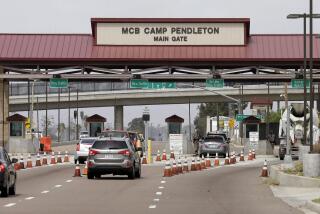Officers Face Grim Task of Calling on Families of War Dead
- Share via
Bracing for the possibility of massive casualties, the Navy and Marine Corps stepped up their training of officers to notify families of war dead in Southern California.
With more than 50,000 San Diego-based troops deployed to the Gulf region, officials realize that the ground war is certain to mean casualties.
“We are ready,” said Chaplain James Mowry of the Chaplain Corps of the U.S. Navy in San Diego. “You just have to say, ‘Lord, give me the strength so that I can do what I have to do, that I can help with consoling.’ ”
Informing a family of a death, many say, is the most difficult task in military service.
“Oh God, my gut just goes into a knot--there’s no describing it,” said Master Chief Petty Officer Paul Copsey, who has served as a casualty assistance calls officer for almost two years.
The language of these solemn messengers is blunt.
They are instructed to use the phrase was killed rather than any euphemism such as expired or passed away . The message, usually delivered in less than a minute, is as direct as it is formulaic.
It begins: “I regret to inform you . . .” And it concludes: “I extend to you and your family my deepest sympathy for your great loss.”
At Camp Pendleton, messengers have borne such tidings to 17 families as the war or accidents have claimed the lives of local Marines.
Local Navy officers, so far, have not been summoned for what is generally considered the most difficult task for those left at the home front.
At Camp Pendleton, officials recently trained all noncommissioned officers and staff officers to be able to make the calls on families--a move that increased the number of qualified messengers from “tens” to where it now stands--”hundreds,” said Cpl. Lynda MacTavish, a Marine spokeswoman.
Navy officials in San Diego have prepared 70 chaplains and more than 200 officers--an increase by more than one-third--to undertake the anguished task of telling families that a relative died in the Middle East. These officers travel as far north as Twentynine Palms.
“Most of us would like to turn this task over to someone else, but we know we are chosen to do it,” Mowry said. “I am not afraid of people crying because that can be good for them. But you just don’t know what you are going to run into.”
Mowry and others inevitably identify with the families, though they try not to let that interfere with their job. Many try to talk to the grief-stricken as they wish someone would talk to their family.
“It’s very difficult--they are strangers, and you have to tell them such bad news,” said Chief Warrant Officer Robin Hester, who joined the Navy 18 years ago.
For Hester and others, as they approach the front door, the minutes seem to stretch. While she walks across the yard in her dress blue uniform, approaching the doorstep, Hester girds herself.
“Deep down, I say a little prayer to God to help me through this,” Hester said.
Hester never knows how a family will respond. Will they blame her? Will they scream? Cry? will she feel that she has consoled them?
After she leaves, she feels physically and emotionally drained. For just that reason, the military prefers to have two officers go to a home, so they can support each other.
“It just feels bad when you confront death. You always confront inadequacies--you wonder if you could have done something better,” Mowry said.
In the Western region that includes Southern California as well as five states, there are 400 such Navy officers. Across the nation, Navy officials have set up a pool of 2,000 escorts who are prepared to accompany bodies to their home towns after they arrive at Dover Air Force Base in Delaware.
“As soon as we get information on casualties, we will get someone on the road to the family within an hour,” said Ken Stinde, the casualty assistance call program coordinator in San Diego.
The military will attempt to inform all families through casualty assistance calls officers, known as CACOs. Although the Navy plans to notify all families in person--and do it quickly--officers acknowledge that, if the death toll climbs, officials may have to resort to telegrams, which were used when deaths mounted during the Vietnam War.
Each branch of the armed services has had to hustle to get a system in place. The Navy, for instance, is accustomed to handling about 600 deaths annually--a number that could easily be exceeded with the sinking of a ship.
More to Read
Sign up for Essential California
The most important California stories and recommendations in your inbox every morning.
You may occasionally receive promotional content from the Los Angeles Times.













